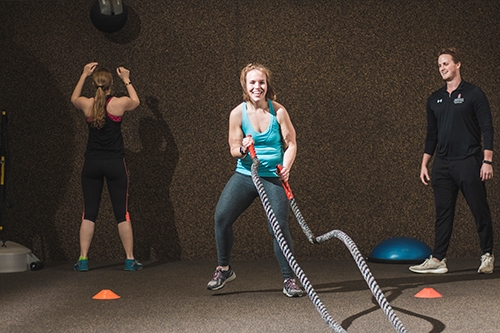
Preparing for a trip to the beach this summer is a good reason to exercise. But, there are plenty of other reasons. And, plenty of options.
Three University of Arkansas doctoral students, all researching exercise, have learned several lessons about exercising for health, fitness and quality of life.
First, there is really no bad exercise, said Jacob Brown:
- Exercise has a number of positive effects on the body. Essentially, you are stressing the body with exercise. Because of that mild stress, the body will adapt and get stronger and, basically, better overall.
- Exercise can help with weight loss and weight management, which could make a big difference for someone who has been diagnosed as pre-diabetic. Type II diabetes occurs when the body can't use insulin properly, and exercise helps the body use glucose efficiently, combatting the inability of insulin to keep blood glucose at normal levels.
Brown recently defended his dissertation in the cell and molecular biology program in the J. William Fulbright College of Arts and Sciences and will go to work for the Oklahoma Medical Research Foundation to study age-related muscle-wasting. He worked in the Integrative Muscle Metabolism Laboratory under Nicholas Greene, an assistant professor of exercise science in the College of Education and Health Professions.
Second, Ricky Perry said, determining your health and fitness goals will help you determine what exercise to do.
- Make your goals as specific as you can and choose a type of exercise that promotes those goals. For example, you can run sprints to exercise anaerobically, which means without oxygen such as activities that require quick bursts of power at high intensities. But that won't improve stamina needed for running a marathon, which requires you to be aerobically well-conditioned. Exercising aerobically, which means with oxygen, features activities that are low to moderate in intensity and are sustainable for long periods of time.
- Consider your body's needs. Swimming is often touted as cardiovascular exercise that is gentle on your body, but as you age you need load-bearing exercises that put stress on your bones to keep them strong, similar to working muscles to keep them strong.
- As your body becomes more efficient doing a particular exercise, it won't need to burn as many calories so changing what you do for exercise will boost your metabolism,
Perry is an exercise science student who conducts research in the Exercise Muscle Biology Laboratory, a part of the Department of Health, Human Performance and Recreation in the College of Education and Health Professions. His dissertation research examines tissue-replacement procedures and the effect of exercise in helping military veterans who suffered traumatic injuries recover more fully.
Third, variety is the spice of life when it comes to exercise, according to Adam Seal.
- Always incorporate cardiovascular exercise into your routine but choose something you enjoy or you won't keep it up. Boredom will doom your adherence to an exercise program.
- As for particular exercises, the squat is king because it uses so many muscle groups, including the core. The core is not just abdominal muscles; it's everything from the top of your knees to below your chest.
- The metabolic demand of an exercise such as the squat burns a lot of calories, relative to some other exercises, and building muscle, in turn, helps boost your metabolism after you stop working out.
- With the spring and summer months ahead, it is important to consider hydration habits throughout the day and during exercise. Generally, recommendations for daily plain water intake for men and women are 3 liters and 2 liters, respectively. If exercising during the warmer months, this total may need to increase because of excessive fluid loss from sweat. Maintaining hydration throughout exercise facilitates proper thermoregulation and may reduce the risk of heat-related illnesses.
Seal is also an exercise science student and conducts research in the Hydration Science Lab, also in the Department of Health, Human Performance and Recreation. He is still developing his dissertation proposal but has been working recently on research about drinking patterns on children's hydration and dehydration in athletes.
The Exercise Science Research Center in the Department of Health, Human Performance and Recreation offers the Fitness for Fun program as well as many opportunities for students and others to participate in research projects. University Recreation offers fitness and wellness programs, personal training, intramural sports and outdoor activities.
Contacts
Heidi S. Wells, director of communications
College of Education and Health Professions
479-575-3138,